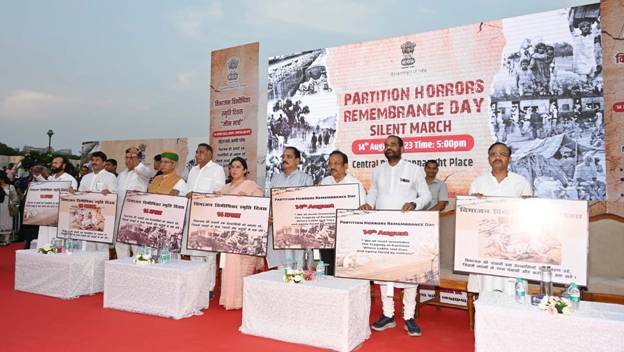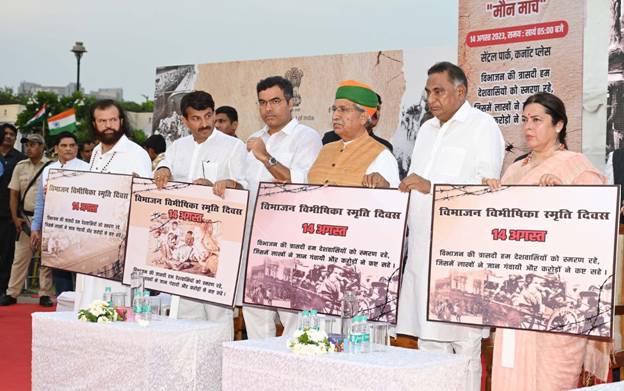Silent March and Exhibition organized at Central Park in Connaught Place, New Delhi to mark Partition Horrors Remembrance Day
As we enter Amrit Kaal, remembering the horrors of partition is an attempt to connect the people especially the youth to the pain and turmoil experienced by the people during Partition. Against this backdrop, the Ministry of Culture Government of India organizes various events and programs across India. National Seminars, Symposiums, exhibitions, Silent March, film screenings, cultural performances, and publication of books are some of the programs being carried out this year. To mark this occasion, an exhibition and silent March was organized at Central Park in Connaught Place in New Delhi today evening.Minister of Commerce & Industry, Consumer Affairs and Textiles Shri Piyush Goel;Union Minister Shri Ashwini Choubey; Minister of State for Culture and Law and Justice Shri Arjun Ram Minister;Minister of State for Culture and External Affairs, Smt. Meenakashi Lekhi; former Union Health Minister and Member of Parliament, Shri Harsh Vardhan, Shri Manoj Tiwari, MP from North-East Delhi and Shri Hansraj Hans, MP from North-West Delhi were present. Many dignitaries including Dr. Sachchidanand Joshi, Member Secretary IGNCA were also present.

Silent Marches were held across India with the involvement of the general public and civil society groups.

Prime Minister Shri. Narendra Modi declared 14th of August every year as ‘Partition Horrors Remembrance Day’ to remind the nation of the sufferings and sacrifices of Indians during the partition in 1947.
The exhibition curated by Indira Gandhi National Centre for the Arts (IGNCA) in collaboration with ICHR (Indian Council of Historical Research) and Partition Museum is made available on https://amritmahotsav.nic.in/partition-horror-remembrance-day.htmat the official website of Ministry of Culture, Government of India. The same exhibition was downloaded and installed by Universities, Institutions, Public offices, Banks, Post offices, Schools, and Colleges in their premises to benefit students and the general public. The exhibition was installed at 16 prominent places in Delhi.
At the exit of the British from India in August 1947, India was partitioned into two independent nation-states: India and Pakistan. The partition of India had devastated millions of lives across the Indian subcontinent. There were riots, unrest, violence, animosity, rapes, massacres, looting, starvation, and one of the largest forced mass migrations in human history that the world has ever witnessed. Millions of people suffered immense loss and endured horrific days and nights. The provinces of Punjab and Bengal have faced the consequences of the catastrophic riots that claimed thousands of lives and left an indelible mark in the psyche of millions of people. The repercussion and trauma as a result of partition are felt and experienced to date.







.png)


0 Comments
IF YOU HAVE ANY DOUBTS, PLEASE LET ME KNOW